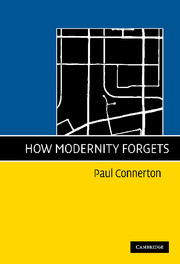1 - Introduction
Published online by Cambridge University Press: 05 July 2015
Summary
The topic of memory is now ubiquitous. Heritage, together with its French and German equivalents, le patrimoine and die Musealisierung, museology, ethnohistory, industrial archaeology, retrofitting, retrochic, Holocaust memorials, counter-monument, counter-memory, lieux de mémoire: all allude to a common constellation of interests. The shape of that constellation stands out in contrast to the way in which memory emerged as something crucial to individual identity, with its fissures and fractures, when it became a central issue in philosophical thinking with Bergson, in psychoanalytic thinking with Freud, and in autobiographical literature with Proust. At the opening of the twentieth century memory was psychologised; at the close of the century the turn was to cultural memory. For the moment the investigation of cultural memory has become a culture industry in its own right.
How can we explain the frequent discussion of and the apparently high value ascribed to memory in recent years? There can be no doubt that the accumulated repercussions of the holocaustal events of the last century have played a vital role in these current preoccupations; but I want to argue that a crucial reason, if not indeed the fundamental explanation, is that modernity has a particular problem with forgetting.
To say this is not to claim that modernity has a monopoly of cultural amnesia, for there are demonstrably different types of structural forgetting specific to different social formations, as anthropologists and classicists were among the first to point out when they investigated the peculiarities of transmission in preliterate societies. Nor is it to claim simply that a cloud of forgetting has descended upon the contemporary horizon; any such assertion would be patently absurd.
- Type
- Chapter
- Information
- How Modernity Forgets , pp. 1 - 6Publisher: Cambridge University PressPrint publication year: 2009



